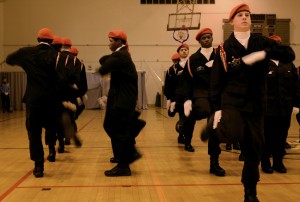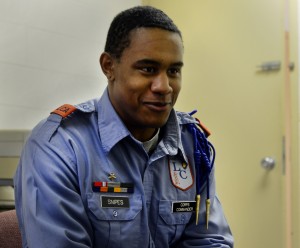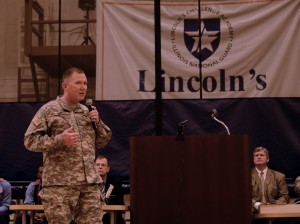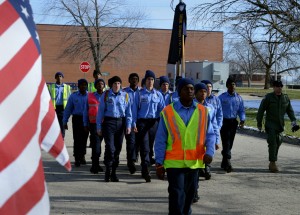Lincoln’s Challenge Academy continues to thrive despite state budget concerns
Chronicle Media — December 8, 2015
Cadets at Lincoln’s Challenge Academy in Rantoul, Ill., stand at attention as they welcome U.S. Army Maj. Gen. Richard J. Hayes Jr., the Adjutant General of the Illinois National Guard, and his staff to their annual Thanksgiving Program Nov. 24. LCA is a program for at-risk youths in Illinois that teaches cadets self-worth, discipline and job skills through a quasi-military, six-month program designed to get them back on track. (U.S. Army photo by Staff Sgt. Bryan Spreitzer, Illinois National Guard Public Affairs)
In 1993 the Department of Defense and the U.S. Air Force decommissioned Chanute Air Force Base in Rantoul, Ill. At the same time, Chanute became the home of Lincoln’s Challenge Academy, a diamond in the rough among the vacant, deteriorating buildings on the sprawling expanse that was once Chanute.
Lincoln’s Challenge Academy is a joint federal and state-funded program that takes at-risk youths in the state and gives them an opportunity to get life training and a second chance at success. The program is a six-month resident program in a quasi-military environment that is built on eight core components: academic excellence, physical fitness, job skills, health and hygiene, responsible citizenship, leadership and fellowship, life coping skills and service to the community.
Though the brick building that once housed Student Squadron 3362 may not look like much from the outside, inside it’s full of people that are thankful this holiday season. They’re thankful because despite state budget concerns, the academy is still operating and still giving at-risk teens an opportunity to make themselves better, more productive members of society.

Tobeyah Snipes, of Chicago, a cadet and the student corps commander at Lincoln’s Challenge Academy smiles as he recounts his reasons for coming to LCA. Snipes said he volunteered to come to LCA to “get back on track and make my mom proud of me again.” The academy’s mission focuses on youth like Snipes and helps them find direction and accomplish goals. (U.S. Army photo by Staff Sgt. Bryan Spreitzer, Illinois National Guard Public Affairs)
Tobeyah Snipes is one of those teens. Snipes grew up on the South Side of Chicago and was a good kid for the most part, he said. During his high school years he started getting in with the wrong crowd.
“I started out on a good path, then I was on a really bad path,” said Snipes. “I realized what I was doing and decided I wanted to do better for me and to make my mom proud.”
Snipes said that his high school guidance counselor gave him some information on Lincoln’s Challenge Academy and he made the choice to volunteer for the six-month program. Now, with only a few weeks left until his graduation, Snipes is the student corps commander, the top leadership position for a student.
Snipes credits the academy with making him a better leader and a better, more caring person.
“Being here didn’t just improve my leadership, it improved my attitude toward other people,” said Snipes. “I wasn’t a social person. I took care of myself, but here I’ve had to not only lead, but take care of my fellow students when they have issues.”
Snipes is in line for an academic scholarship to junior college when he graduates from the academy. He said that he owes the faculty and the staff at LCA for giving him “the upper hand on life” that he needed.

U.S. Army Maj. Gen. Richard J. Hayes Jr., the Adjutant General of the Illinois National Guard, addresses cadre, staff and cadets at Lincoln’s Challenge Academy during its annual Thanksgiving Program Nov. 24. Hayes stressed the importance of the LCA program and reassured cadets, cadre and staff members that the Illinois National Guard and its leadership are dedicated to the continued success of the program. (U.S. Army photo by Staff Sgt. Bryan Spreitzer, Illinois National Guard Public Affairs)
Peter Thomas, the academy’s director, said the program’s main goal is to give teens the tools they need to succeed in life. Thomas said the program gives those teens that are falling into the wrong crowd or doing the wrong thing another option, a way to be better.
“The first thing that we do is build up their self-worth; we let them know they can stand on their own two feet,” said Thomas. “Here at Lincoln’s Challenge Academy there is no right or wrong crowd, it’s all the right crowd here. We teach students how to do the right thing, get along with each other and how to identify who they are.”
Thomas said giving students the ability to recognize who they are gives them a better chance at success and a better chance of staying on the right path when they graduate.
Thomas said that running the program isn’t without challenges, but as a retired Army command sergeant major, he knows what has to get done day to day to keep the academy successful and keep the students and cadre moving forward. Most of the challenges are logistical and fiscal.
“Most of the time we have trouble keeping people here in this small community,” said Thomas. “The kids come here expecting the big city and have trouble getting used to the small community. So we do the best we can to provide opportunities for the students to get to places like Champaign to relax and have a good time.”
Thomas said even though it’s not something that he is tasked to handle, the big challenge this year was getting the program started without a state budget, a fact not overlooked by leadership at the state level.
Air Force Col. Lee Wheeler, the Director of Staff for the Illinois Air National Guard and LCA’s federal program manager, said that this year’s first class started about two weeks late because of budget issues.
“The program is funded both by state money and federal funds from National Guard Bureau,” said Wheeler. “We get 25 percent of our budget from the state, then NGB funds the remaining 75 percent when the state has a signed budget. This year we ran into some issues because Illinois legislators hadn’t passed a budget by Oct. 1, the start of the government’s fiscal year.”
Wheeler said that senior National Guard leadership spearheaded the fight to get LCA funded. He said that Maj. Gen. Richard J. Hayes Jr., Illinois’ Adjutant General, was the driving force, working very hard to explain the situation to officials at NGB.
“General Hayes worked very hard to convince the National Guard Bureau that by virtue of the fact that the state was paying our employees, we could project out through the life of the current contract,” said Wheeler. “He argued that we were matching what our state share would normally be. So, even without a state budget NGB released federal funds to us.”

Cadets with the Lincoln’s Challenge Academy Drill Team perform at LCA’s annual Thanksgiving Program Nov. 24. LCA is a program for at-risk youths in Illinois that teaches cadets self-worth, discipline and job skills through a quasi-military, six-month program designed to get them back on track. (U.S. Army photo by Staff Sgt. Bryan Spreitzer, Illinois National Guard Public Affairs)
Wheeler said that without Hayes’ efforts and the efforts of Gov. Bruce Rauner’s staff, federal funding would not have been released and the program would have been shut down. Wheeler said that even shutting down the program for one fiscal year would likely doom the more than 20-year-old program. He said that he is thankful that senior leaders took the time to understand the importance of the program.
“The program has an impact throughout the state,” said Wheeler. “We offer a unique alternative training program that offers a structured, quasi-military environment for kids that have dropped out of school or might drop out of school and possibly get into trouble an opportunity to get their GED certificates and become productive members of society.”
Hayes brought senior staff officers on his team to visit LCA for their annual Thanksgiving program Nov. 24 to allow them to see what the academy is doing for the community.
“Lincoln’s Challenge Academy is important to the Illinois National Guard and to the statewide community,” said Hayes. “It provides a means and a place for at-risk teens within the state to find themselves, to build their self-esteem, confidence, education and life skills to make them productive members of our society; it is a program which prepares them for a bright future. As leaders in the state it is critical we fully support this mission as the consequences of not doing so creates more long-term systemic problems for society. With the help and support of Rauner’s team we made sure the academy’s mission could continue this fiscal year. We are looking forward to starting our second class in January and have ample room to accommodate motivated teens wanting a brighter future. I encourage all with a desire to attend to contact the accessions staff.”
Lincoln’s Challenge Academy started as a pilot program more than 20 years ago and has seen more than 14,400 cadets graduate from the program. Cadets graduating from LCA go on to succeed later in life, 75 percent earn their GED certificates, 49 percent enter the workforce, 34 percent continue to college and 12 percent join the military.
To keep LCA operating and successful, it will take an effort from not only the Illinois National Guard and NGB, but the community as well, said Thomas.
“We will continue to meet with our leaders and state officials to help get the resources we need to keep moving forward but we still need help from the community,” said Thomas. “Go talk to your representatives and your legislators and tell them how important LCA is and ask what can be done to support the program.”
The brick and mortar building that once housed Airmen training to repair and maintain the Minuteman intercontinental ballistic missile on Rantoul’s Chanute Air Force Base has been transformed into a launching pad to propel at-risk teens in Illinois into a brighter future.
“When these kids graduate, it makes me as happy as they are,” said Thomas. “We have been successful in giving that young man or young lady that first step in life to be successful. Many times it just takes that one step, that initial step to accomplishing something to prove to themselves that they are something and they can do this.”



